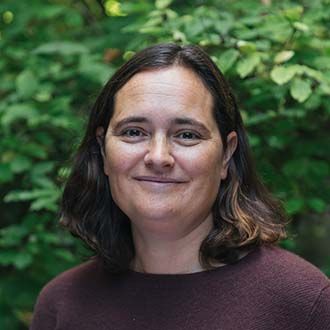Professor Charlotte Williams
About
Charlotte K. Williams is a professor of Inorganic Chemistry and Associate Head of Department (Research) in Oxford Chemistry. She is an EPSRC Established Career Research Fellow and member of the Strategic Advisory Team in Manufacturing the Future. She heads-up a research group investigating carbon dioxide utilization, polymerization catalysis and polymer chemistry with a particular focus on improving polymer sustainability. She develops highly active catalysts that transform abundant renewable resources and wastes into polymers. These catalysts enable natural bio-chemicals and carbon dioxide to replace petrochemicals in scalable materials production. By combining expertise in catalysis and polymer chemistry the goal is to deliver materials with better properties than today’s petrochemicals and which are designed for end-life recycling and (bio)degradation.
Prof Williams is the co-ordinator of The Oxford Martin School Future of plastics Programme, This is a four-year programme which started in October 2019 and is aimed at providing key research to underpin a transition to a new, sustainable plastics economy, with greater circularity, more recycling, higher proportions of plastics produced from bio-feedstocks and greater degradability as appropriate. Developing interventions to change technology, law, social policy, human behaviour and economics, as well as the prototyping of patented materials and products, will be essential to achieving this. The research is aimed at moving towards a future that limits environmental harm without losing the many benefits that plastics provide.
Charlotte has published 150 peer reviewed publications and 36 patents. She founded Econic technologies, employing >20 UK staff. She co-authored 4 Policy Briefings for the Royal Society and led the CS3 White paper and symposium –Science to Enable Sustainable Plastics. In 2021 Charlotte was elected as a Fellow of the Royal Society for her work in developing new sustainable technologies for polymer production and carbon dioxide usage.
Her work has also been recognised by the Royal Society of Chemistry Tilden Prize (2021), Academia Europaea (2021), in the Queen’s Birthday Honours List (2020), by the Macro Group UK Medal (2019), the Otto Roelen Medal of DECHEMA and the German Catalysis Society (2018) and the Sir John Meurig Thomas Medal for Catalysis (2017). She has supervised >40 postdoctoral researchers and >25 PhD graduates with former group members going on to success in academia (16 former group members are now academics in universities worldwide), industry, government and education. She currently leads a multidisciplinary team of 20 researchers.
A collaboration between Prof Williams, along with Professor Matthew Rosseinsky and Professor Andrew Cooper at the University of Liverpool and Unilever which has been awarded Prosperity Partnership funding from the Engineering and Physical Sciences Research Council (EPSRC), aims to provide methods to manufacture all the materials used in Unilever’s products whilst completely avoiding the use of virgin petrochemicals.
The recent award of the Research England funded iCAST (Innovation Centre in Advanced Sustainable Technologies) supports a collaboration between U. Bath, U. Oxford, National Composites Centre and Centre for Process Intensification and Swindon and Wiltshire LEP. As a co-director of iCAST, Prof Williams is managing the large-scale programme of research focussed on translation, industrial implementation and business models for sustainable products.
With support from the UK Catalysis Hub, Charlotte has worked on projects ‘New sustainable polymer architectures for high performance plastics’ (2019 to 2021) and ‘From Rings to Polymers and Back Again: Catalytic Recycling of Waste Oxygenated Plastics’ (2021 to 2022)
Expertise
- Plastics
- Polymers
- Sustainable plastic
- CO2
- Carbon capture
- Polymer properties as plastics, elastics, engineering materials, composites and adhesives
- Carbon Dioxide Reduction to liquid Fuels and Energy Vectors
- Carbon Dioxide Utilization to make polymers and materials
Selected publications
- Switchable Catalysis Improves the Properties of CO2-Derived Polymers: Poly(cyclohexene carbonate-b-ε-decalactone-b-cyclohexene carbonate) Adhesives, Elastomers, and Toughened Plastics
- Understanding metal synergy in heterodinuclear catalysts for the copolymerization of CO2 and epoxides
- Triblock polyester thermoplastic elastomers with semi-aromatic polymer end blocks by ring-opening copolymerization
- Sequence Control from Mixtures: Switchable Polymerization Catalysis and Future Materials Applications
- Sustainable polymers from renewable resources
- Royal Society Policy Briefing: Sustainable Aviation Fuels (2021)
- Royal Society Policy Briefing: “Future of Fuels” (2019)
- Royal Society Policy Briefing: “The Potential and Limitations of Using CO2” (2017)
- Royal Society Sackler Forum and Report: “Dealing with CO2 at Scale” (2017)
- Royal Society Policy Briefing: “The Potential and Limitations of Using CO2” (2017)
